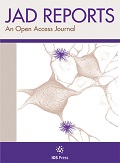Authors: Balietti, Marta | Galeazzi, Roberta | Giacconi, Robertina | Santillo, Elpidio | Giuli, Cinzia
Article Type:
Research Article
Abstract:
Background: Elevated cortisol levels represent a risk factor for Alzheimer’s disease (AD), prompting treatments to lower hormone concentrations for preventive or therapeutic purposes. Objective: To assess the efficacy of a comprehensive intervention (CI) in modulating serum cortisol levels in patients with AD. Methods: CI consisted in a 2-month protocol involving cognitive stimulation, psychological support, lifestyle guidance, leisure activities, and socialization. AD subjects were randomly assigned to experimental (EG, n = 45) and control (CG, n = 45) groups. A wide range of sociodemographic, cognitive, psychosocial, and functional conditions were evaluated before, at the conclusion, and 24 months after
…CI. Data about lifestyle and drug prescription were also recorded. Results: Baseline evaluations revealed that higher cortisol levels correlated with worse cognitive status (higher CDR and ADAS-Cog values and lower MMSE scores), increased depressive symptoms, and reduced physical and social engagement. Following CI, EG exhibited reduced cortisol levels, improved overall cognitive status, and enhanced verbal working memory and executive functions compared to CG. However, at the 24-month follow-up, EG displayed a rebound effect, characterized by elevated cortisol levels and cognitive decline compared to CG. Conclusions: These findings strengthen the adverse relationship between excessive cortisol and deficits in cognition/behavior in AD, demonstrate the short-term benefits of CI, and emphasize the potential long-term risks, which may be attributed to the fragile nature of the AD brain. Comprehensive interventions can yield positive results, but careful calibration of type and duration is necessary, considering disease progression and the potential need for re-administration.
Show more
Keywords: Alzheimer’s disease, cognitive performance, comprehensive intervention, cortisol
DOI: 10.3233/ADR-230125
Citation: Journal of Alzheimer's Disease Reports,
vol. 7, no. 1, pp. 1445-1453, 2023





